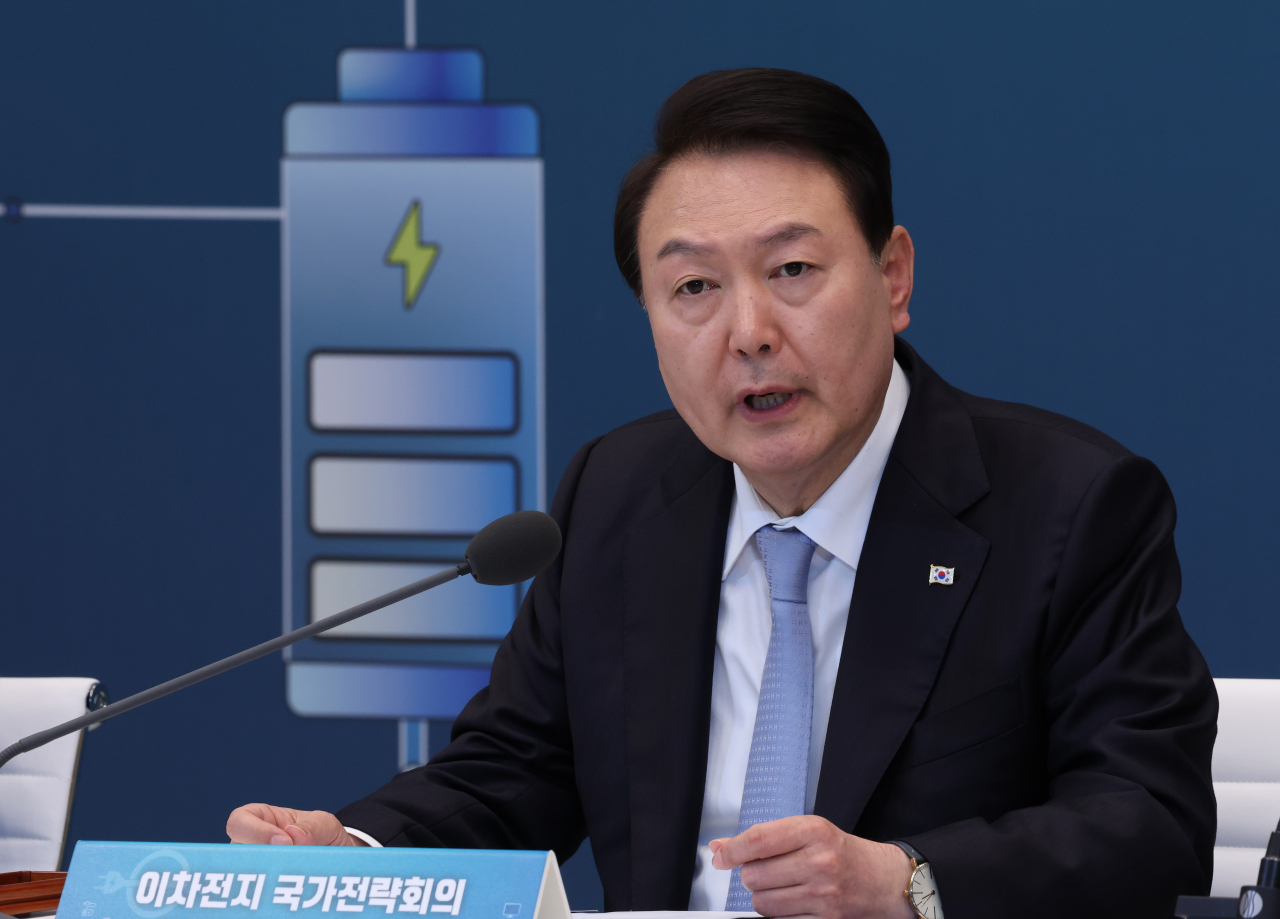Korea eyes W20tr boost for secondary battery sector through 2030
Public, private sectors look to commercialize world’s 1st solid-state battery
By Kan Hyeong-wooPublished : April 20, 2023 - 17:28

South Korea will invest 20 trillion won ($15 billion) in research and development of secondary batteries for electric vehicles through 2030 to secure global competitiveness, the government said Thursday.
"Secondary batteries are among the country’s crucial strategic assets, along with semiconductors. Their importance cannot be stressed enough. Secondary batteries are at the center of the global competition for technological supremacy. It is the power of EVs in times of carbon neutrality and the key for digital transformation," said President Yoon Suk Yeol, who chaired the national strategy meeting held to discuss plans to strengthen the power of Korea’s secondary battery industry.
About 70 people -- including top government officials, chiefs of battery makers and scholars -- attended Thursday’s meeting.
"Securing core next-generational technology will determine our fate in the future. The secondary battery industry is an area where technological innovation is actively taking place. We have to maintain our competitiveness and ‘super gap’ with technological innovation that can upgrade performance and safety in a revolutionary way," Yoon said.
The president stressed that the secondary battery sector must ensure a stable supply chain of critical minerals and materials, voicing the need to put in all necessary measures to establish a firm ecosystem and to provide support for the private sector.
"Based on collaboration between the public and private sectors, we actively responded to the (US Inflation Reduction Act's) guidance. I believe it turned out to be a chance for our companies to solidify a strong position in the North American market," he said.
The Ministry of Trade, Industry and Energy unveiled a detailed roadmap to enhance the country’s secondary battery sector at the president-led meeting.
The government laid out targets for increasing the domestic production capacity of cathode materials by four times to 1.58 million metric tons and boosting the country’s export of battery equipment by three times to 3.5 billion won over the next five years.
In order to secure what the government calls a “super gap” in technology, the ministry said the country’s three battery makers -- LG Energy Solution, SK On and Samsung SDI -- will set up mother factories in Korea intended to lead the development and production of cutting-edge batteries.
The public and private sectors shared the vision of securing the world’s first technology to produce solid-state batteries on a mass scale along with the goals to manufacture lithium-metal batteries and lithium-sulfur batteries.
The government said it will create a 500 billion won fund to nurture the country’s battery material, parts and equipment businesses. The government will also expand tax incentives for battery material companies to activate domestic investment. Through a collaboration between the private sector and academia, the government will push for a special law to aid the efforts to foster 16,000 skilled workers in the secondary battery industry by 2030.
According to the ministry, the government and private sector plan to inject over 350 billion won into developing the technologies of lithium nickel manganese cobalt oxide (NCM) batteries, lithium iron phosphate (LFP) batteries and energy storage systems (ESS).
They will aim to develop NCM batteries that have a driving distance of over 800 kilometers by 2030, a marginal increase from the current capacity of 500 km. They will also work to secure the top-notch technology of LFP batteries and expand the export of ESS by five times by 2030. Combining these goals, the Korean battery industry will seek to achieve a 40 percent share of the global secondary battery market in 2030.
Seeking to create a complete life cycle of the battery industry within the country, the government laid out a goal of establishing an environment that allows 100 percent of all secondary batteries to be recycled.
According to the government, the Korea Battery Industry Association will set up a management system to allow the private sector to trade used batteries freely and utilize them for new businesses. The KBIA will also draft a database dedicated to tracking the life cycle of secondary batteries and preventing unauthorized discard or use of secondary batteries. On top of that, the government will review enacting a special act to effectively manage secondhand batteries.
“As the secondary battery sector faces a fast-moving global market and rapid technological developments, bolder investments are required to keep up global competitiveness,” said Trade Minister Lee Chang-yang. “The public and private sectors will join forces so (Korea) can become the most powerful country in terms of technology and market share by 2030.”


















![[KH Explains] Hyundai's full hybrid edge to pay off amid slow transition to pure EVs](http://res.heraldm.com/phpwas/restmb_idxmake.php?idx=652&simg=/content/image/2024/04/18/20240418050645_0.jpg&u=20240418181020)

![[Today’s K-pop] Zico drops snippet of collaboration with Jennie](http://res.heraldm.com/phpwas/restmb_idxmake.php?idx=642&simg=/content/image/2024/04/18/20240418050702_0.jpg&u=)